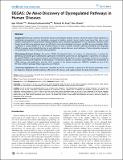DEGAS: de novo discovery of dysregulated pathways in human diseases
Author(s)
Ulitsky, Igor; Shamir, Ron; Krishnamurthy, Akshay; Karp, Richard M.
DownloadUlitsky-2010-DEGAS_ de novo disco.pdf (1.395Mb)
PUBLISHER_CC
Publisher with Creative Commons License
Creative Commons Attribution
Terms of use
Metadata
Show full item recordAbstract
Background
Molecular studies of the human disease transcriptome typically involve a search for genes whose expression is significantly dysregulated in sick individuals compared to healthy controls. Recent studies have found that only a small number of the genes in human disease-related pathways show consistent dysregulation in sick individuals. However, those studies found that some pathway genes are affected in most sick individuals, but genes can differ among individuals. While a pathway is usually defined as a set of genes known to share a specific function, pathway boundaries are frequently difficult to assign, and methods that rely on such definition cannot discover novel pathways. Protein interaction networks can potentially be used to overcome these problems.
Methodology/Principal Findings
We present DEGAS (DysrEgulated Gene set Analysis via Subnetworks), a method for identifying connected gene subnetworks significantly enriched for genes that are dysregulated in specimens of a disease. We applied DEGAS to seven human diseases and obtained statistically significant results that appear to home in on compact pathways enriched with hallmarks of the diseases. In Parkinson's disease, we provide novel evidence for involvement of mRNA splicing, cell proliferation, and the 14-3-3 complex in the disease progression. DEGAS is available as part of the MATISSE software package (http://acgt.cs.tau.ac.il/matisse).
Conclusions/Significance
The subnetworks identified by DEGAS can provide a signature of the disease potentially useful for diagnosis, pinpoint possible pathways affected by the disease, and suggest targets for drug intervention.
Date issued
2010-10Department
Massachusetts Institute of Technology. Department of Biology; Whitehead Institute for Biomedical ResearchJournal
PLoS ONE
Publisher
Public Library of Science
Citation
Ulitsky, Igor et al. “DEGAS: De Novo Discovery of Dysregulated Pathways in Human Diseases.” PLoS ONE 5.10 (2010): e13367.
Version: Final published version
ISSN
1932-6203